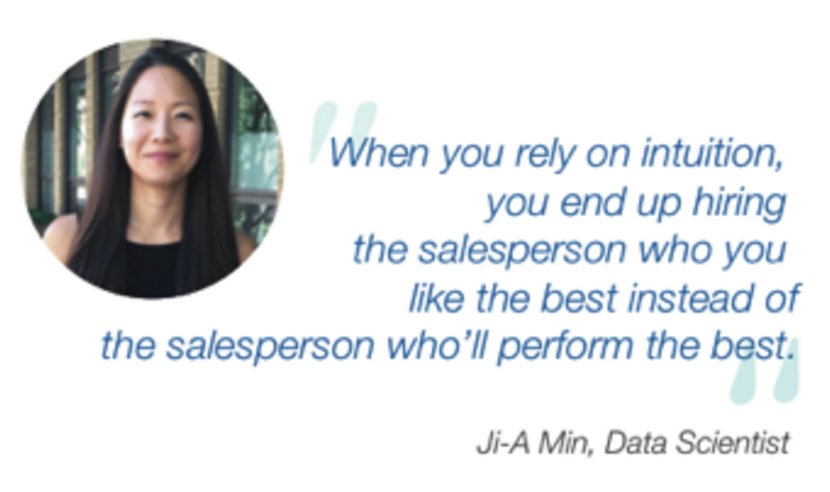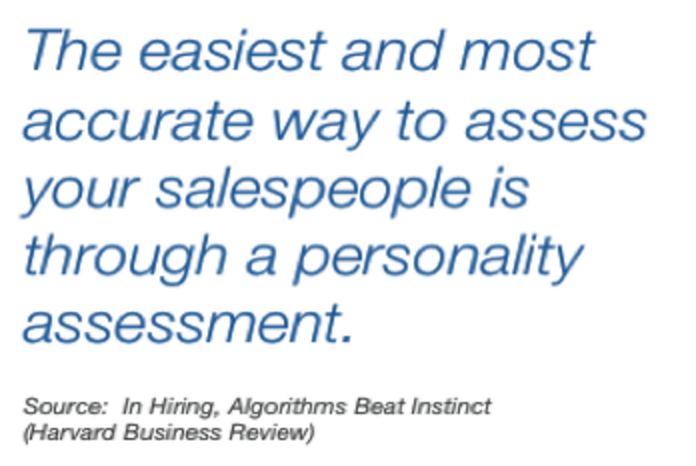These 3 Psychological Biases Prove It’s Time to Put an End To “Gut Feel” Sales Hiring
Sales Hiring Is Broken
Let me know if this sounds familiar. At my last company, we had to build out our sales team and scale very quickly. We had no benchmark, no structured interviews and, quite honestly, no idea how to hire for our team. We would actually hire two reps at once, praying one would work out.
This is usually how it went down:
- A spot opened up on our sales team
- We would rush to fill the opening since every day without a rep was costing us
- I would filter through resumes based on… gut feel
- We would interview ~8 candidates
- Thinking, “We reallllly don’t have time for this right now,” we would hire two reps based 90% on gut feel
- Both new hires weren’t quite what they seemed to be in the interview, despite their charm
- At least one of the new hires was not a good fit for our company and was eventually terminated (This can be costly since a DePaul University Sales Effectiveness Study reports an average cost per turnover of $97,690 for sales hires.)
Sound familiar? Let me show you what decades of academic research has taught us about this broken hiring cycle. And then let me show you how to solve it. First, the three psychological biases you will encounter.
It’s Not You, It’s Your Gut
 No matter how good of a judge of character you believe you are, there are three major risks to using your gut feel to hire. These three concepts are proven psychological biases. Think you’re the only one? Not by a long shot. All hiring managers are plagued with these biases when they conduct unstructured interviews using their “intuition.” So the good news is you’re not alone. The bad news is: the way you’re hiring is broken.
No matter how good of a judge of character you believe you are, there are three major risks to using your gut feel to hire. These three concepts are proven psychological biases. Think you’re the only one? Not by a long shot. All hiring managers are plagued with these biases when they conduct unstructured interviews using their “intuition.” So the good news is you’re not alone. The bad news is: the way you’re hiring is broken.
Let’s take a look at the science behind these three dangerous biases:
Bias #1: You Automatically Grade Sales Reps on a Curve
After a few interviews with some under-qualified sales candidates, the next average candidate that walks through the door looks amazing to you. You’ve created a curve without even knowing it. Dubbed the “contrast effect,” you may be inclined to hire a poor rep, just because the few you saw before them were weak at best.
That sales rep doesn’t really impress you, but it is going to seem like they do. They may display no significant positive sales personality traits, they were just in the right place at the right time. Don’t get pulled into grading on a curve.
Your sales candidates should be meeting the objective standards you’ve already set for sales hires before the screening process. It is OK to not make a hire. In the long run, standardization and being selective will pay off. As recommended by Evan Bartlett of Building The Sales Machine: Use data to build a sales success profile using your existing top performers. With that profile in hand, you will be able to benchmark each future candidate.
Bias #2: You Equate a Great Interview With a Great Sales Rep
There will always be sales reps who are great at interviewing. You might be one yourself. With a bit of charm and a firm handshake they’re able to win you over so well that you’re tempted to hire them on the spot. I mean, when it comes down to it, that’s the sign of a great rep, they can sell themselves! So this candidate is perfect for the job, right?
Unfortunately the ability to sell yourself is only one part of what makes someone a successful sale rep. There are a lot of people who can interview extremely well. But this doesn’t take into account the adaptability, drive, and critical thinking abilities correlated with sales success.
How should you go about assessing these skills? It’s difficult in an interview. In fact, research by Cortina and colleagues found that interviews add little value for predicting on-the-job performance at all. Use an assessment. Sales ability and personality assessments are much better predictors of on the job success. Organizations that use assessments to hire enjoy a 20.7% average increase in sales revenue.
Bias #3: You make emotional decisions when hiring sales reps
Hiring is emotional. It’s whether or not you feel like you can work with this sales rep or whether or not you feel like they will fit into the company culture. That’s a lot of feeling involved, and most of the time, emotional decisions don’t end well.
We may not want to admit it but new research shows that employees hired based on assessments and algorithms end up better than employees hired based on the judgment of human recruiters.
How to Change Your Ways
 Attack these biases head on. Avoid being blinded by them by putting in place objective measures of skill and personality. Data trumps gut every time. Instead of relying on emotion when making sales hires, rely on data to gain insights into sales candidates’ personality and selling skills.
Attack these biases head on. Avoid being blinded by them by putting in place objective measures of skill and personality. Data trumps gut every time. Instead of relying on emotion when making sales hires, rely on data to gain insights into sales candidates’ personality and selling skills.
Given the choice of gut and data, I’ll pick data every time. Of course you can hire people the old fashioned way, but you’re ultimately gambling with your time and money. I say, invest in a system to assess and benchmark your team. Watch out for these biases when interviewing. Only conduct structured interviews. Keep you money in your pocket and watch your team close more deals. Good luck!
This guest post was authored by Somen Mondal. Mondal is the CEO of Ideal, which automates candidate sourcing to duplicate your top performers.
